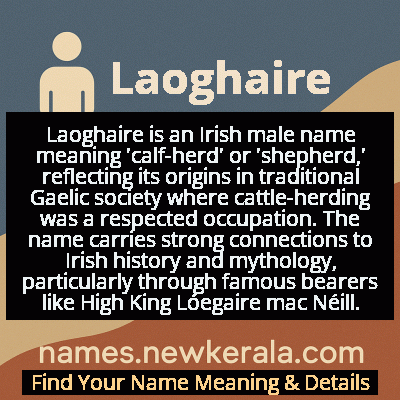Laoghaire Name Meaning & Details
Origin, Popularity, Numerology Analysis & Name Meaning of Laoghaire
Discover the origin, meaning, and cultural significance of the name LAOGHAIRE. Delve into its historical roots and explore the lasting impact it has had on communities and traditions.
Name
Laoghaire
Gender
Male
Origin
Irish
Lucky Number
4
Meaning of the Name - Laoghaire
Laoghaire is an Irish male name meaning 'calf-herd' or 'shepherd,' reflecting its origins in traditional Gaelic society where cattle-herding was a respected occupation. The name carries strong connections to Irish history and mythology, particularly through famous bearers like High King Lóegaire mac Néill.
Laoghaire - Complete Numerology Analysis
Your Numerology Number
Based on Pythagorean Numerology System
Ruling Planet
Uranus (Rahu)
Positive Nature
Strong sense of order, loyal, practical, and disciplined.
Negative Traits
Stubborn, overly serious, rigid, and prone to feeling restricted.
Lucky Colours
Blue, gray.
Lucky Days
Saturday.
Lucky Stones
Blue sapphire.
Harmony Numbers
1, 7, 8.
Best Suited Professions
Managers, engineers, accountants, organizers.
What People Like About You
Dependability, discipline, practicality.
Famous People Named Laoghaire
Lóegaire mac Néill
High King of Ireland
5th-century monarch who encountered St. Patrick and facilitated Ireland's Christianization
Lóegaire Búadach
Mythological Warrior
Heroic figure in the Ulster Cycle, known for martial prowess and loyalty
Laoghaire Mac an Bhaird
Bardic Poet
16th-century poet preserving Irish literary traditions during cultural transition
Name Variations & International Equivalents
Click on blue names to explore their detailed meanings. Gray names with will be available soon.
Cultural & Historical Significance
The name's etymology itself reflects fundamental aspects of ancient Irish society, where cattle represented wealth, status, and sustenance. A skilled calf-herd or shepherd was not merely a laborer but someone responsible for maintaining community prosperity. This agricultural foundation connects Laoghaire to the land and traditional Irish ways of life that persisted despite political and religious changes. The name's survival through centuries of English domination testifies to the resilience of Irish language and identity, making it more than just a personal identifier but a symbol of cultural endurance.
Extended Personality Analysis
The name Laoghaire carries strong associations with leadership, resilience, and deep-rooted connection to heritage. Individuals with this name are often perceived as natural leaders who combine practical wisdom with visionary thinking—qualities reflected in both the historical High King and mythological warrior who bore the name. There's an expectation of strength and determination, but also of responsibility and guardianship, echoing the shepherd symbolism inherent in the name's meaning. These individuals may demonstrate a unique balance of tradition and adaptability, capable of honoring the past while navigating contemporary challenges.
Psychologically, the name suggests someone with strong protective instincts, whether toward family, community, or principles. The historical context implies a capacity for making difficult decisions during times of transition, suggesting emotional resilience and strategic thinking. There's often an air of quiet authority rather than overt dominance, with leadership emerging from competence and reliability. The name also carries hints of complexity—the historical Laoghaire's initial resistance to Christianity suggests independent thinking, while his eventual accommodation demonstrates pragmatic wisdom. This creates a personality profile of someone who thinks deeply, values authenticity, and possesses the courage to stand by their convictions while remaining open to necessary evolution.
Modern Usage & Popularity
In contemporary naming practices, Laoghaire remains firmly in the category of traditional Irish names that serve as conscious cultural statements rather than fashionable choices. Its usage is almost exclusively confined to Ireland and families of Irish descent seeking to maintain linguistic and cultural connections. The name has never achieved widespread popularity due to its challenging pronunciation for English speakers (typically rendered as 'LEER-ee' or 'LAIR-eh'), which has limited its adoption outside Gaelic-speaking communities. However, it maintains a steady, if modest, presence as a heritage name, particularly in regions with strong Irish identity. Recent exposure through popular culture, notably the Outlander series, has increased recognition of the name but hasn't significantly boosted its usage statistics. It stands as a name chosen for its deep cultural resonance rather than contemporary trends, representing a commitment to preserving Irish linguistic heritage in an increasingly globalized world.
Symbolic & Spiritual Meanings
Symbolically, Laoghaire represents the enduring connection between leadership and stewardship, weaving together themes of authority, protection, and cultural continuity. The name embodies the concept of the shepherd-king—a ruler who serves as both protector and guide, responsible for the wellbeing of their community. This dual symbolism extends to the name's historical context, representing Ireland's navigation between its indigenous traditions and external influences. The calf-herd etymology connects to fundamental values of sustenance, wealth, and the relationship between humanity and the natural world.
Metaphorically, Laoghaire signifies cultural resilience—the ability to maintain identity through centuries of change and challenge. It represents the preservation of language and tradition against forces of assimilation, making it a symbol of Irish cultural survival. The name also carries connotations of bridge-building, reflecting the historical Laoghaire's position between pagan and Christian Ireland. In a broader sense, it symbolizes the importance of roots and heritage in forming identity, while acknowledging the necessity of adaptation and growth. The name serves as a living connection to Ireland's complex history, embodying both the struggles and triumphs of the Irish people.

